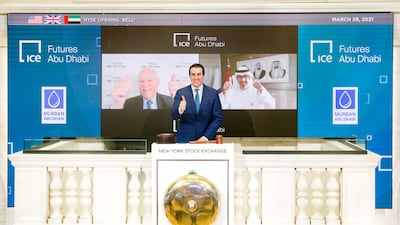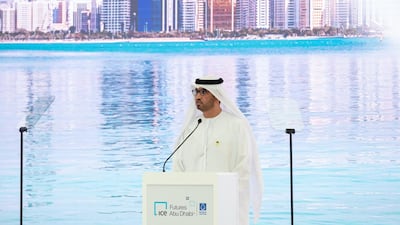Abu Dhabi National Oil Company rang the opening bell at the New York Stock Exchange to celebrate the launch on Monday of crude futures contracts tracking the UAE's flagship Murban grade.
Murban joins the ranks of Brent, the most widely-traded oil benchmark, and US gauge West Texas Intermediate in pricing and trading oil.
Jeffrey Sprecher, chairman of ICE, and Dr Sultan Al Jaber, Minister of Industry and Advanced Technology, Adnoc managing director and group chief executive, rang the opening bell in an online ceremony to mark the occasion.
"We believe on its very first day Murban will become a globally recognised benchmark," Mr Sprecher said in a video message earlier on Monday.
The Abu Dhabi grade, which flows at approximately 1.7 million barrels per day, accounts for half of the UAE's production.
Murban fills a void in oil trading and pricing in the Middle East, which is the biggest supplier of crude to global energy markets.
The crude grade's international role is supported by Adnoc's recent removal of destination clauses in its trade.
The Abu Dhabi commodities exchange, on which Murban crude futures will be bought and sold, is operated by Intercontinental Exchange, also known as ICE. ICE is also responsible for the Brent benchmark, under which two-third's of the world's oil is traded. It is also the parent of NYSE.
_________________________
Read more: Dr Sultan Al Jaber: Murban Futures mirror the UAE's rise on the world stage
_________________________
The ICE Futures Abu Dhabi Exchange is backed by oil companies such as Thailand’s PTT, Japan’s JXTG and Inpex, BP, France’s Total, South Korea’s GS Caltex, PetroChina, Anglo-Dutch major Shell and Vitol. The companies are operators and off-takers of Abu Dhabi crude, particularly those destined for Asia.
Adnoc's other crude grades, Upper Zakum, Das and Umm Lulu, will be priced at a differential to Murban.
Murban was trading at $64.03 per barrel at 3pm UAE time with 6,293 lots of futures and 2,510 related cash-settled derivatives, Intercontinental Exchange said on Twitter. Brent, the international benchmark, was up 1.05 per cent trading at $65.25 per barrel at 3.14pm UAE time. WTI was gained 0.95 per cent to trade at $61.55 per barrel.
Sheikh Mansour bin Zayed, Deputy Prime Minister and Minister of Presidential Affairs, attended the launch of Murban crude futures trading at Abu Dhabi Global Market on Al Maryah Island on Monday.
In a tweet after the event, Sheikh Mansour said the trading of Murban crude futures would enhance the UAE's global competitiveness.
Posting on twitter ahead of the launch, Sheikh Saif bin Zayed, Minister of Interior and Deputy Prime Minister, said the trading of Murban crude futures “will enhance the position of the UAE capital as a leading and global energy centre”.
Murban establishes Abu Dhabi as a 'world class' commodities hub, Adnoc CEO says
Dr Al Jaber said the trading of Murban futures is a milestone for Adnoc and its partners.
"This represents a significant milestone for Adnoc, ICE, our customers and of course our partners,” he said.
"We will establish Abu Dhabi as a world class commodities trading hub.
"That is simply the case because starting today Murban futures will be freely traded from Singapore, and from Abu Dhabi, to New York. In fact, whenever there is a trading screen, Murban will be on that screen," he added.
The contract for future delivery can be traded 22 hours a day, five days a week.
Murban, a light, sweet type of crude, is popular in the Asian markets.
"Murban came from humble beginnings, from with just one oil field in 1958 and only 4,000 bpd of production. Now it flows from 2,000 wells and 12 fields and accounts for more than half of the UAE's total oil production," Dr Al Jaber said.
____________________
Read more: Robin Mills: Abu Dhabi's Murban futures will enhance the efficiency of global oil pricing
____________________
It is chosen for its stability and "capacity to meet increased demand", he added.
The new contract represented "a great value proposition" across the entire crude trading value chain, Dr Al Jaber said.
"[It's] a win win for everyone involved, customers will be able to better manage market risks. While more value will be created for producers," he added.
The launch of a new crude futures contract and the setting up of a new exchange will "boost liquidity and add vibrancy" to the capital markets in Abu Dhabi, according to Ahmed Al Sayegh, Minister of State and executive chairman of ADGM.
The launch of a futures contract for Murban will also "increase arbitrage trading opportunities, regionally, and globally," said Mr Al Sayegh said during the event.
The new benchmark will allow for more options to manage risk and clear trades, he added.
"For international investors, this delivers greater and more efficient access to our region ... it means doing more business closer to home," Mr Al Sayegh said.
Murban to offer more 'transparency' to global oil markets
The trading of a new benchmark based on a single, high-quality Middle East crude will offer more "transparency" to global oil markets, particularly to customers in Asia, chief executives of international energy companies said on Monday.
"There is a lack today, in the eastern hemisphere of a strong benchmark which is essential for developing the markets. It is for good for customers [and] good for producers," said Patrick Pouyanne, chairman and chief executive at France's Total.
"Murban has a strong advantage ... it is a quality crude."
Mr Pouyanne attended the launch in Abu Dhabi on Monday.
He was joined online by Bernard Looney, chief executive of BP, Takayuki Ueda, president chief executive of Japan's Inpex, as well as Russel Hardy, chief executive of trading company, Vitol, the world's largest oil-trading company. They are backing the Murban futures contract and the Abu Dhabi commodities exchange.
Brent, under which two-thirds of global crude is traded, is calculated on the basis of production from fields in the North Sea. However, output from the crude in the North Sea is in the decline, making it an unreliable indicator of global trade in crude. WTI tracks US crude grades and reflects output from different variants of oil in the world's largest producer of oil and gas.
Murban, on the other hand, offers a simpler, more stable trading option.
The new Abu Dhabi exchange and the Murban benchmark will help an oil-producing region like the Middle East "manage the risks and also to meet the growing energy demand", said BP's Mr Looney.
Murban will now be accessible to a "larger number of customers and contribute to further economic and social development in many parts of the world including in Asia", said Inpex's Mr Ueda.
Adnoc's removal of destination clauses on the trading of Murban was an "important thing" to help begin the trade flow, said Vitol's Mr Hardy.
A new futures contract for Murban will "reduce the uncertainty and improve the pricing for everybody as we move forward", he added.











